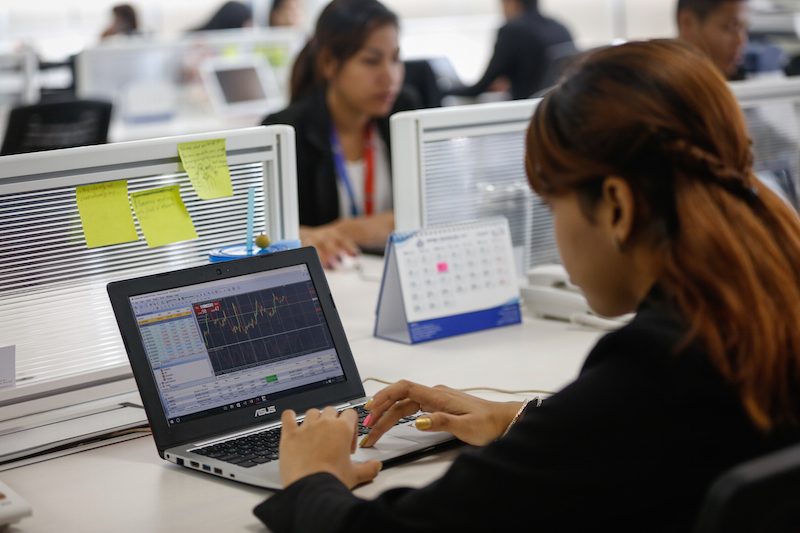Sitting in a cafe on Phnom Penh’s Sothearos Boulevard last month, a group of young Cambodians gazed at their computer screens, watching the movement of currency around the globe.
During their regular weekday trading session in the foreign exchange market, dubbed forex or FX, they anticipate market moves, debate price points and evaluate risk.

Yosof Ibrahim, the group’s Cambodian mentor, has been trading from his laptop since 2012, four years before the government granted the first two official trading licenses for derivatives in August.
Mr. Ibrahim and his budding traders typically deal in three generally stable currencies: the euro, the British pound and the Japanese yen. Britain’s vote in June to leave the E.U. battered the British pound the day after the vote, leading to what analysts described as the biggest intraday fall of any major currency in decades.
“We earned a lot of money on the day of the vote of Brexit this June by selling the pound and euro,” Mr. Ibrahim said.
Foreign exchange rates, together with prices on the metals market, are the main derivatives being traded in the country, for the first time using a financial tool regulated by the Security Exchange Commission of Cambodia (SECC).
The first official licenses for derivative trading were given last month to Golden FX Link and Phnom Penh Securities (PPS), which will trade on third-party clearinghouses or brokerage firms approved by the SECC.
The value of derivatives is derived from other underlying assets, with traders betting on future prices and standing to make or lose money with only small fluctuations.
Golden FX Link was intrigued by the possibilities that Cambodia’s market offered, said Monisa Yang, associate director of the financial consulting department for the company, which launched in 1991 in Hong Kong, where it is known as First Gold.
“We noticed a good business potential here and the country is gradually developing into a more sophisticated market in securities,” Ms. Yang said.
In Cambodia, First Gold has about $1 million in play at any one time through a few hundred registered accounts. In comparison, in Hong Kong, the company has 15,000 individual brokerages and 5,000 corporate brokerages with customers throughout Asia and beyond.
Still, the operations in Phnom Penh are polished compared to the cafe setting of Mr. Ibrahim and his disciples. In a 10th-floor office in Golden Tower, about 50 men and women in suits sit at rows of computers with prices rising and falling on the screens in front of them.
Alex Yong, vice general manager of business development at PPS, the second company to receive an SECC license, also predicts growth in derivative trading in Cambodia.
When derivative trading first came into Cambodia, brokers were largely misunderstood, and sometimes seen as operating an illegal Ponzi scheme, he said. With the government’s licensing, new investors will gain more confidence and experienced investors who currently trade abroad “will move their money back to create accounts at legal firms in Cambodia,” Mr. Yong said.
Mr. Ibrahim, the local trader, started out with a foreign account, then recently switched to PPS. His monthly trading volume, which varies between $40,000 and $50,000, provides a monthly profit that ranges from 5 to 20 percent, or a minimum of $2,000, he said.
“It is a risky investment. And you will lose a lot of money if you don’t know the rules,” he said.
“I normally recommend my students first start to trade with a demo, the trial version, before creating the real account to trade with real money,” he said. “Still, overall, 90 percent will lose, and only 10 percent will make profit.”
Huge losses are possible.
Luke Hunt, co-author of “Barings Lost,” provides a sobering case in point with his book about trader Nick Leeson and the 1995 collapse of the London-based Barings Bank through speculative derivative contracts.
He said Cambodia’s derivatives market will create challenges for the government’s regulators, who may need technical assistance, which they could find abroad.
“Cambodia has a stock market and as such it should have a derivatives market as well. They go together. But whether the Cambodian securities authorities are capable of monitoring and regulating the market to international standards is the crucial question,” he said.
“The big issue is money laundering,” Mr. Hunt added. “They need to guard against this. If they don’t, then the international authorities will step in and they will have major problems to deal with, which this country simply doesn’t need.”
Officials at the SECC did not respond to requests for comment.
Building the market for derivatives is a key component in the final stage of Cambodia’s 10-year strategy—from 2006 to 2015—to develop its financial markets, along with investment and pension funds and securities, such as stocks and bonds.
In its proclamation regulating derivatives trading, the SECC said brokers would be required to provide investment counseling services or publish analyses about investing in derivatives. Licensed firms must also demonstrate appropriate expertise, trading infrastructure and risk management systems, it says.



